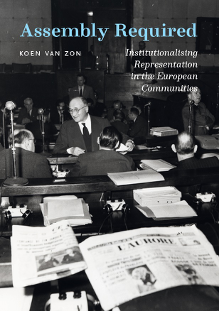It is commonplace in politics, media and academia to portray the European Union (EU) as a technocracy, run by a faceless elite of rule-obsessed busybodies. Scholars and journalists have shown time and again that this image does not account for the member states, for no European laws get passed without them. Yet, the image of the EU as an undemocratic organisation persists, which also raises the question where this leaves the EU’s ‘democratic’ institutions, such as the European Parliament. Why have the institutions which represent popular interests at the European level not been able to fundamentally challenge the technocratic nature of the EU?
A question of power?

In my PhD thesis, I set out to answer this question. To that end, I studied the first generation of European representatives who built the European Parliament and the Economic and Social Committee (the EU’s socio-economic advisory council) during the 1950s and 1960s. Many historians and political scientists would suggest that these institutions were unable to reform the European Community from within because they lacked the power. True, the European Parliament only had one power when it was set up in 1952, namely to control and ultimately depose the High Authority (today’s European Commission). This weapon was considered so drastic, however, that the representatives did not even dare threaten to use it. Moreover, they were seldom highly critical of the policymakers in the European Commission, but considered them to be allies in the creation of a united Europe.
Consensus seekers
Many Members of the European Parliament (MEPs) considered themselves prototypical Europeans. They were delegated from national parliaments, but realised that they had a much more forceful voice when they claimed to speak on behalf of millions of Europeans instead of only the Dutch, French or West-Germans. Interestingly, this culture of commonality took next to no time to emerge as well, despite all the different linguistic, cultural and political backgrounds that came together in Strasbourg. MEPs understood intuitively that they stood strong when they emphasised what bound them together, not what separated them – especially in a Community where seeking consensus was considered a value in its own. Because of this attitude, the European Community lacked the kind of political arena that allowed citizens to engage with European decision making processes and identify with the standpoints of the different political groups.
European elections
MEPs were all too aware that Europeans hardly took an interest in the goings on in the European Parliament. Still, their main aim during the 1950s and 1960s was to organise European elections – an ambition that was only realised in 1979. After all, if the European Parliament had the backing of millions of voters, it would surely be able to acquire the legislative powers it longed after. There was a paradox, however: if the success of European elections hinged on the voter turnout, but there was an obvious lack of interest in the European Parliament, how would this work? In a 1960 debate, MEPs solved this tension by arguing that the first European elections would convert people to the European ideal and mobilise them for European elections. Critics of this idea were accused of lacking faith in the European ideal.
Opposition or unison?
From modern-day viewpoint, the first generation of MEPs had a very narrow understanding of democracy, but one that can only be understood in the context of the time and environment in which they operated. From the difficult position MEPs were in, they saw democratising the European Community as a claim to power, not as an end in itself. To them, European elections and democratisation were not necessarily a challenge of the technocratic logic in the European Community, but a strengthening of the European project as a whole. The European Parliament did not seek opposition, but unison. This approach was arguably very successful, since it made the European Parliament into the powerful body it is today. As far as fashioning the European Parliament into a political arena is concerned, however, there remains work to be done.

Dr. Koen van Zon defended his PhD thesis, Assembly Required. Institutionalising Representation in the European Communities, at Radboud University Nijmegen. He currently works as a postdoctoral researcher at Utrecht University, on the research project Consumers on the March: Civic Activism and Political Representation in Europe, 1960s to 1990s, in which he studies the history of the representation of consumer interests in the European Community.
